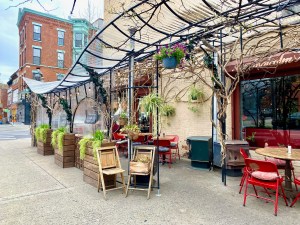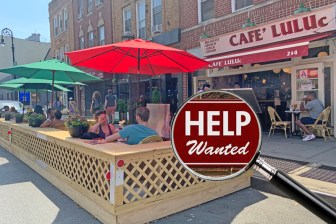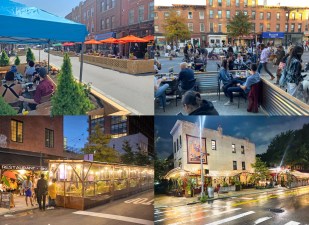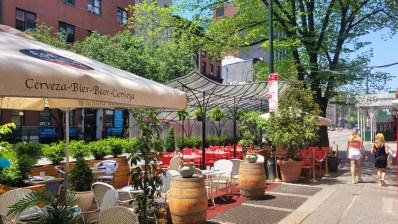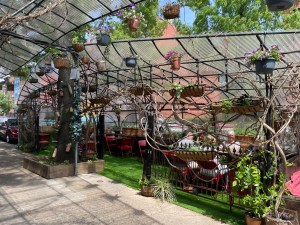EXCLU: Council Will Move Ahead with Seasonal Outdoor Dining Plan
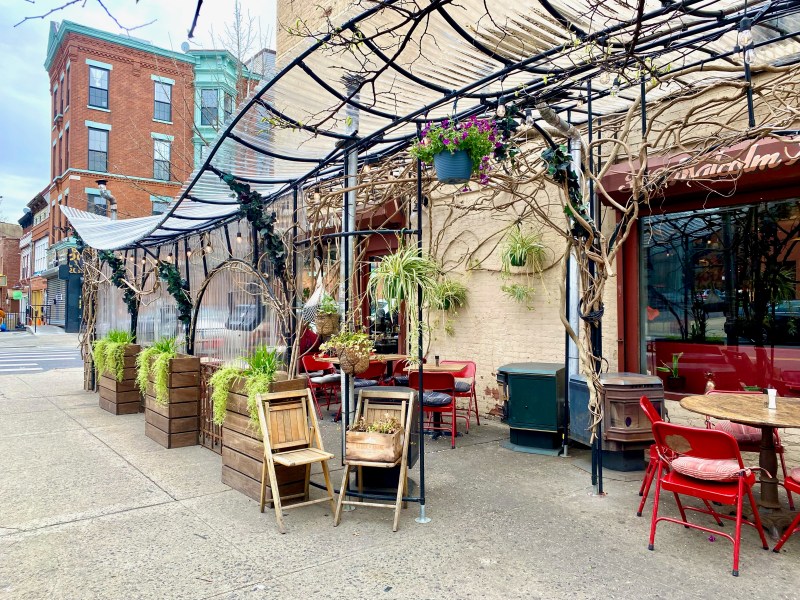
The Council plans to make the city’s outdoor dining program permanent, but the roadside “streeteries” will become just seasonal, as part of revised legislation expected to come before lawmakers next month, Council sources told Streetsblog. The bill would also keep the pandemic-era program under the auspices of the Department of Transportation.
The proposal to replace the temporary initiative will finally move ahead after the original bill stalled for more than a year, but open space advocates and restaurateurs slammed city politicians for pushing to restrict the curbside setups to only part of the year.
“I’m heartbroken, I can’t believe they would do something like that,” said Charlotta Janssen, owner of Chez Oskar, a bistro with an ornate dining structure along Malcom X Boulevard in Bedford-Stuyvesant, Brooklyn. “New York is a 24/7, 12-month-a-year town. We’re not a resort town.”
Council Member Justin Brannan told Streetsblog outdoor dining on the sidewalk will continue without seasonal restrictions, adding that the lawmakers intend to advance a proposal with more standardized designs for the temporary sheds in the street.
“The plan is not to make permanent the current outdoor dining sheds you see on our streets or continue with this patchwork quilt of random structures – some that are impressive and creative extensions of their brick-and-mortar motherships and some that have come to more closely resemble abandoned shipwrecks from the First World War – but to create a better program with new rules, new standards, clear design guidelines and operating requirements, moving away from the year-round structures that often sit empty during the winter months,” said Brannan (D-Bay Ridge).
Council leadership under Speaker Adrienne Adams has been at odds with Mayor Adams about which city agency should run outdoor dining long term. Hizzoner favored DOT, which has run the popular Covid-era program, while the original bill by Council Member Marjorie Velázquez (D-Bronx) would have moved outdoor dining back to the much smaller Department of Consumer and Worker Protection, which oversaw the more limited sidewalk cafés prior to the 2020 health crisis.
Mayor Adams cited outdoor dining as a priority in his State of the City address last month, saying it was “time to retire those Covid cabins and replace them with something better.”
Speaker Adams said this month that she and her colleagues were fine-tuning the bill to find the right “balance” fort businesses and neighborhoods across the city. The top city pol previously opined that she didn’t think outdoor dining should be in the roadway, but later said she was only expressing her personal view.
The overwhelming majority of the Council’s 51 elected members declined to respond to a Streetsblog survey a few weeks ago to detail what each wanted for permanent outdoor dining, but of the nine electeds who did respond, five said they wanted a year-round option.
Jackson Chabot, director of advocacy at Open Plans (a sister organization of Streetsblog), was glad to see progress, but also urged the city to keep al-fresco dining open all year.
“We’re excited to see the legislation finally come to fruition and place the program it its proper agency,” Chabot told Streetsblog. “What we saw at the outset of this program is the potential for a visionary program, and not including year round reduces the scope and reduces the vision of how we can continue to reimagine the streetscapes and have a program that works.
“A year-round option is an absolute must,” the advocate said.
Janssen said she was still struggling to make up pandemic losses, and said smaller-scale movable furniture during the warmer months wouldn’t cut it.
“I don’t know how I’m going to survive with that,” she said. “Have any of [the politicians] realized how much work restaurants are?”
Demand for the sidewalk sheds remains steady across the year, she said.
“This pandemic isn’t over,” she added. “We have some families that have elderly and toddlers that were really happy to dine out there.”
Progress to make the program permanent had been stalled by the political disagreements along with a pair of lawsuits by critics who complained about noise, rats, and loss of private car parking spaces due to the curbside sheds.
City leaders credited the initiative with saving 100,000 jobs during the coronavirus outbreak, and a recent NYU study found the program outgrew its sidewalk predecessor 12-fold, thanks to the quicker and cheaper application process.
Outdoor dining also came to 17 community districts that didn’t have any sidewalk eateries before, and it was a boon especially in blue-collar neighborhoods outside of Manhattan that are predominantly people of color, the researchers found.
The head of the industry lobbying group the Hospitality Alliance, said the city must get the final law right.
“Our restaurants, their customers and our communities deserve a great permanent outdoor dining program from our government leaders that cuts the red tape, busts the bureaucracy, and reduces the cost for small businesses, while addressing problems that exist with the emergency program for both restaurants and residents,” said Andrew Rigie.
A spokesperson for Mayor Adams said he is optimistic the administration and the Council will get a permanent program done.
“We’re committed to a permanent open restaurants program that supports New York City’s small businesses and communities. We’re working closely with the council on this legislation and optimistic we can get this done,” said Kate Smart in a statement.
Speaker Adams’s office did not respond to a request for comment.
